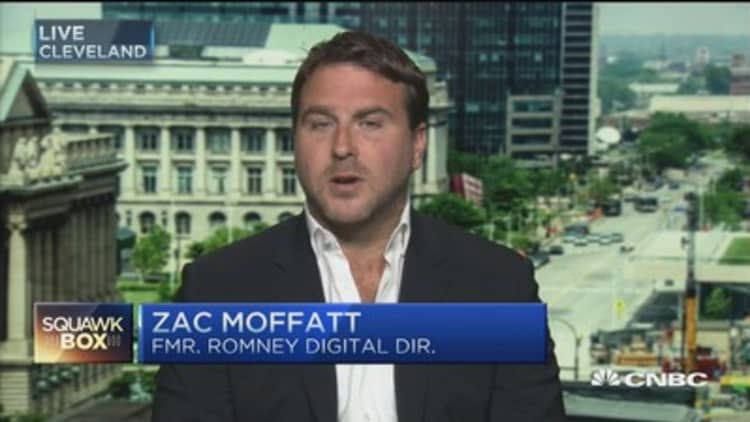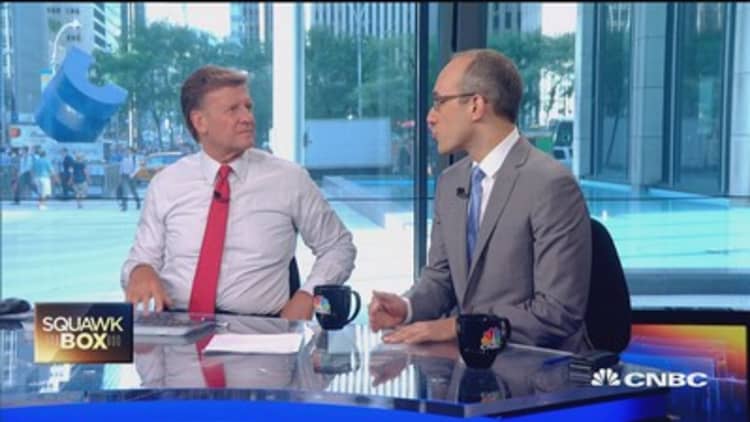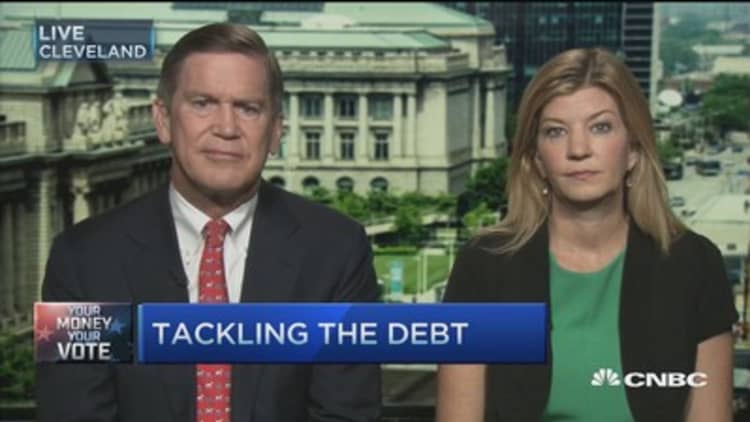


As the 2016 Republican candidates for president prepare to take the stage in two debates Thursday night, the focus has been Donald Trump, Donald Trump and Donald Trump.
The billionaire real estate mogul—who headlines the prime-time Fox News debate as the No. 1 polling candidate among the top 10—has harnessed social media in an unprecedented way, according to Zac Moffatt, who was digital director for Mitt Romney's presidential campaign.
"I think social media plays a massive role in his ability to get his message out and kind of speak directly to people, which probably won't have happened even 10 years ago," he said on CNBC's "Squawk Box" Thursday. "And it seems to be resonating."
With huge followings on Twitter and Facebook, Trump has been able to speak to millions of potential voters and "bypass traditional media," said Moffatt, who's online ad targeting company Targeted Victory has also served GOP presidential hopeful Marco Rubio's senate campaign.
"Donald Trump has really figured out how to drive his message through social media without always having to do interviews in person or do live events," he added. "Social media is a really good platform for him."
The nine other candidates in Fox's prime-time debate are former Florida Gov. Jeb Bush; Wisconsin Gov. Scott Walker; former Arkansas Gov. Mike Huckabee; retired neurosurgeon Ben Carson; Texas Sen. Ted Cruz; Florida Sen. Rubio; Kentucky Sen. Rand Paul; New Jersey Gov. Chris Christie; and Ohio Gov. John Kasich.
The seven other GOP hopefuls who didn't make the cut for the prime-time event will take part in an early evening Fox debate. The lineup includes former Texas Gov. Rick Perry; former Pennsylvania Sen. Rick Santorum; Louisiana Gov. Bobby Jindal; former Hewlett-Packard chief Carly Fiorina; South Carolina Sen. Lindsey Graham; former New York Gov. George Pataki; and former Virginia Gov. Jim Gilmore.
Make no mistake, all the presidential candidates on both sides of the aisle are aggressively using social media, and Facebook and Twitter have been recently ramping-up their digital tools aimed at helping campaigns reach out to voters.
Moffatt sees Facebook as the most important platform. "Facebook just has the size and scale and tool sets more than anyone else."
"You build out a very large following and then you can use the ad tools to really make sure you're on people's mobile phones," he explained. "What you're really seeing is the advertising to insert yourself into people's conversations and into their lives, and it shows up in their feeds."
Twitter and Google-owned YouTube are also really important, he said.
In fact, Democratic hopeful Hillary Clinton used Twitter to disseminate her April YouTube video that officially announced her presidential candidacy.
Disappearing photo and video app Snapchat, popular with millennials, is also making a major push this election cycle, said Moffatt. "You're starting a new conversation probably to people you are traditionally missing otherwise. You're not catching them on broadcast. They're maybe not even using some of these other social networks."
Republican presidential challenger Bush used Snapchat as an integral part in the launch of his campaign in June.
The primary system in American politics is a "grueling two-year process," said Moffatt, who played a part in helping Romney secure the Republican presidential nomination in 2012. "At the end of it, the right people tend to come out."
But as Romney learned in his loss to President Barack Obama in the general election, getting your party's nod is just the beginning—a step each of the 2016 Republican candidates on the national debate stage Thursday night hope to take.





